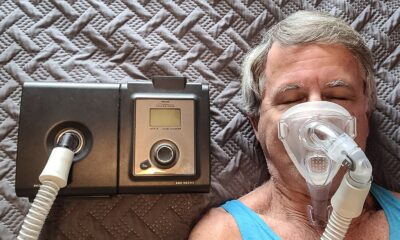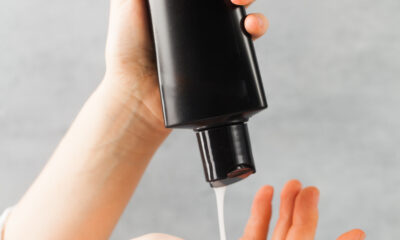Insights
Asbestos in Johnson & Johnson’s Baby Powder and Shower to Shower Products
Published
1 year agoon

IN A NUTSHELL
Who Does This Alert Affect?
Anyone who was diagnosed with ovarian cancer and had used a Johnson & Johnson talcum-based powder.
What is Happening?
In May 2020, Johnson & Johnson announced that it was taking its talc-based baby powder off the market and ceasing all sales in the United States and Canada. Since then, the corporation has stopped selling the product everywhere. Thousands of Johnson & Johnson baby powder cases claiming the product caused cancer led to this ruling.
Women and their families who claimed their ovarian cancer or mesothelioma was caused by the daily use of talcum powder products in numerous baby powder cancer lawsuits have received enormous rewards from juries.
Steps You Can Take:
If you or a loved one used talcum powder and later developed ovarian cancer, you may be entitled to compensation. For additional details, please complete the form on this page. After you get in touch, and attorney may get in touch with you personally to ask you a few questions and provide further information about what it means to file a case.
How Will a Lawsuit Benefit me?
If successful, lawsuits may provide financial compensation for pain and suffering, lost wages, medical costs, funeral expenses, and more.
Despite the many victims who developed cancer after using the company’s talc-based powder for years and billion-dollar verdicts, Johnson & Johnson continues to deny that its products cause any harm.
Many women around the nation have filed lawsuits against Johnson & Johnson, claiming that the usage of the company’s talcum powder products close to the genital area can result in ovarian cancer. Verdicts of millions of dollars have been awarded in several of these cases.
These lawsuits assert that Johnson & Johnson was aware of a connection between talc and ovarian cancer since at least 1982, when it was discovered that women who used talcum-based powders had an elevated risk of cancer. Despite this knowledge, the company never included a warning about this risk on its talcum powders and continues to promote these products for the very purposes that may put women at risk for cancer.
Can Talc Lead to Cancer?
The American Cancer Society reports that around 3,000 individuals are diagnosed with mesothelioma each year in the United States.
Most of these cases are caused by exposure to asbestos. Why women acquire mesothelioma has long confounded doctors and researchers. However, recent study has discovered asbestos in products commonly used by women, such as Johnson & Johnson talcum powder and baby powder.
Talc particles are believed to migrate up the reproductive system and enter the ovaries when talcum powder is used near the genitals. Because the body has difficulty eliminating talc particles, they may linger in the ovarian tissue and induce inflammation, which may lead to the formation of malignant tumors.
Women are at an Increased Risk of Developing Mesothelioma
Doctors and researchers have long been perplexed as to why women get mesothelioma. However, new studies discovered amounts of asbestos in items often used by women, such as Johnson & Johnson talcum powder.
Several recent studies, including one published in the International Journal of Occupational and Environmental Health in October 2014, have found a possible association between talcum powder and mesothelioma. According to the researchers, consistent usage of talcum powder may have resulted in the death of at least one unidentified woman from mesothelioma.
According to Mesothelioma.com, talc is found near asbestos in the ground, which means that the asbestos has the potential to contaminate the talc.
According to Drug Watch, around 40% of women regularly use talcum powder for personal hygiene after bathing and showering. Johnson & Johnson Baby Powder and Shower to Shower are two of the most popular talcum powder products they employ.
Increased Risk of Ovarian Cancer
According to baby powder cancer lawsuits, studies have proven a significant link between talc-based baby powder and ovarian cancer. This includes evidence of talc-containing ovarian cancer tumors.
Plaintiffs contend that this evidence should be grounds for legal action, but Johnson & Johnson and other manufacturers of talc-based baby powders have failed to provide enough notice about these risks on their products.
According to American Cancer Society data, ovarian cancer, which ranks fifth in women’s cancer deaths, kills more women than any other cancer of the female reproductive system. Ovarian cancer affects one out of every 78 women and kills one out of every 108.
According to Drug Watch, those who use talcum baby powder on their vaginal area on a regular basis increase their risk of ovarian cancer by 24%.
For decades, customers were unaware of a probable relationship between talcum powder and cancer, potentially placing hundreds of thousands at danger.
According to Public Health Watchdog, using talcum powder on the vaginal area might allow it to enter the body and cause inflammation, creating a favorable environment for cancer to grow. The microscopic particles have been discovered deep into some women’s pelvis and ovaries and can survive for years inside the body.
Talcum Powder Use is Linked to Ovarian Cancer
Almost two dozen studies on talcum powder have been conducted over the last several decades, with virtually all of them concluding that women who use talc near their genitals are at an elevated risk of developing cancer.
In 1971, the first study to establish a relationship between talcum powder and ovarian cancer was published. According to the findings of that study, women who used these powders near their genitals had talc particles “well lodged” in the majority of their ovarian tumors and roughly half of their cervical tumors.
Over the years, more than 20 additional investigations have produced similar results. While some of these studies revealed that women were at a 30 percent elevated risk of having ovarian cancer after using talcum powder, some suggested that this risk may be as high as 300 percent. The most recent meta-analyses of these trials, published in the International Journal of Cancer Research and Treatment in 2003, discovered that using talcum powder was related with a 33% increased risk of getting ovarian cancer.
Johnson & Johnson Announces Recall on Baby Powder
Johnson & Johnson recalled its iconic baby powder products in October 2019 after the FDA discovered levels of asbestos in one of the containers.
According to Asbestos.com, the recall prompted many large shops to promptly remove all 22-ounce Johnson & Johnson baby powder items from their shelves.
Johnson & Johnson decided to stop selling baby powder in North America in May 2020. According to the corporation, this decision was influenced by consumer trends rather than safety concerns about talc.
“Johnson & Johnson remains stubbornly convinced in the safety of talc-based Johnson’s Baby Powder,” the company added.
Despite widespread concern over the safety of talc-based baby powder, Johnson & Johnson shareholders voted in May 2022 to continue global sales. The shareholder-submitted proposal called for a worldwide ban on baby powder sales and mentioned Johnson & Johnson’s ongoing legal troubles. According to the proposal, banning the sale of baby powder will improve Johnson & Johnson’s reputation and prevent future litigation from non-North American regions.
Talcum Powder connection to Cancer Lawsuit Settlements
Several cancer lawsuits involving talcum powder have resulted in settlements.
According to Reuters, a California jury ordered $25.7 million in damages paid by Johnson & Johnson to a 68-year-old woman diagnosed with mesothelioma in 2016.
In July 2018, a Missouri jury awarded $4.69 billion to 22 women and their families who claimed asbestos in Johnson & Johnson talcum powder products caused their ovarian cancer, according to Reuters. Later, the award was lowered to $2.1 billion. Even after the verdict was reduced, Johnson & Johnson attempted to appeal. However, the United States Supreme Court declined to consider the company’s appeal in June 2021, securing the verdict payout for dozens of plaintiffs.
More than 9,000 baby powder cancer cases have been filed against the Johnson & Johnson nationwide, alleging that talc-based products, including Shower to Shower and Johnson’s Baby Powder, cause cancer.
Enroll Now!
Have you or a loved one been diagnosed with ovarian cancer or mesothelioma after using Johnson & Johnsons Talcum Powder or Shower to Shower daily for at least four years? If this is the case, you may be able to pursue a baby powder cancer lawsuit.
To find out if you qualify to join, complete the form on this page. If you are eligible, a attorney will get in touch with you free of charge to go through the specifics of your potential case.
Legal


NCAA Intends to Enhance Consumer Protection in Ever-Changing NIL Era
Charlie Baker, the president of the NCAA, has expressed the urgent need to establish a “consumer protection system” tailored for...


Redefining the Game: How One Attorney’s Fight Could Revolutionize College Athletes’ Rights
John “Jake” Krupski, a seasoned labor attorney from New Hampshire, was well-versed in representing the rights of various workers, including...


Clemson Files Lawsuit Over ACC Grant of Rights, Looking for Exit Out of Conference
In a bold move that reverberates across the collegiate sports landscape, Clemson University has taken the Atlantic Coast Conference (ACC)...


The Enhanced Games: A Controversial Pro-PEDs Take on the Olympics
In a daring departure from conventional sports norms, billionaire entrepreneur Peter Thiel, co-founder of PayPal and Palantir, is making waves...


Lawsuit Against Mars Inc. Claims Dark Chocolate Contains Toxic Metals
A proposed class action lawsuit has been filed in New York federal court claiming Mars Inc. failed to warn consumers...


CPAP Machines and Mechanical Ventilators Recalled Over Issues with Foam
LEARN MORE CASE UPDATE: On January 29, 2023, Philips Respironics announced it would halt sales of all its breathing machines in...











